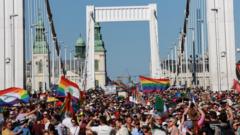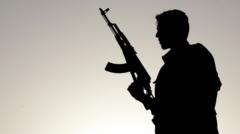A newly signed peace agreement between the Democratic Republic of Congo and Rwanda has been met with skepticism, especially in the rebel-held city of Goma. While some see it as hopeful, critics, including former Congolese President Joseph Kabila, argue the deal overlooks crucial stakeholders and fails to address the core issues causing the enduring conflict.
Skepticism Surrounds New DR Congo-Rwanda Peace Agreement Amidst Ongoing Conflict

Skepticism Surrounds New DR Congo-Rwanda Peace Agreement Amidst Ongoing Conflict
Mixed reactions arise following the signing of a landmark peace deal in Washington as residents question its legitimacy and viability.
In a move aimed at resolving longstanding tensions, the Democratic Republic of Congo (DRC) and Rwanda recently signed a peace agreement in Washington, but the reaction on the ground suggests a complicated path ahead. This deal has been met with a mix of hope and disbelief, particularly in Goma, a city currently under the control of the M23 rebel group.
Former DRC President Joseph Kabila has been vocal in his skepticism, outright dismissing the agreement as merely a “trade agreement.” Many share his apprehension, given the lack of detail around the terms, particularly regarding the engagement, disarmament, and potential integration of armed groups like M23 into the broader peace process.
The deal comes after M23 captured significant territory in eastern DRC, including the vital city of Goma and strategic airports, causing a humanitarian crisis with thousands losing their lives and more being displaced. In response to this escalation, the DRC government sought U.S. intervention, purportedly offering access to its rich mineral wealth in exchange for security assurances.
Kabila expressed doubts about the participants involved in the signing, questioning why M23 representatives were notably absent from the talks. "We must stop distorting the facts to disguise a propaganda agenda," he stated, emphasizing the necessity of truthful dialogues for the Congolese people rather than "diplomatic shows."
Residents in Goma echoed Kabila’s sentiments, posing that true peace cannot be achieved without the inclusion of all conflict parties, including M23. “People are tired; they don’t want discussions anymore. They just want peace,” remarked one local, reflecting the widespread frustration with past failed agreements.
Citing concerns over human rights and sustainable peace, Sam Zarifi from Physicians for Human Rights noted that the current agreement lacks vital provisions for accountability and justice for the violations inflicted on survivors. He asserted that proxy armed groups could still foment hostilities due to the deal's omissions.
Amidst the critiques, there are those who view the peace deal as a crucial step forward. Stephanie Marungu, leading a humanitarian organization in Goma, expressed a more optimistic perspective, heralding this event as a potential catalyst for stability and enhanced aid access. And while one local resident remained hopeful, echoing the sentiment that if this agreement paves the way for peace, they will support it, many still harbor fears that the real beneficiaries of the deal will not be the general populace but rather those profiting off the region’s resources.
As the ramifications of the Washington-brokered agreement unfold, the path to a stable and just peace for the Democratic Republic of Congo remains unpredictable and fraught with challenges.
Former DRC President Joseph Kabila has been vocal in his skepticism, outright dismissing the agreement as merely a “trade agreement.” Many share his apprehension, given the lack of detail around the terms, particularly regarding the engagement, disarmament, and potential integration of armed groups like M23 into the broader peace process.
The deal comes after M23 captured significant territory in eastern DRC, including the vital city of Goma and strategic airports, causing a humanitarian crisis with thousands losing their lives and more being displaced. In response to this escalation, the DRC government sought U.S. intervention, purportedly offering access to its rich mineral wealth in exchange for security assurances.
Kabila expressed doubts about the participants involved in the signing, questioning why M23 representatives were notably absent from the talks. "We must stop distorting the facts to disguise a propaganda agenda," he stated, emphasizing the necessity of truthful dialogues for the Congolese people rather than "diplomatic shows."
Residents in Goma echoed Kabila’s sentiments, posing that true peace cannot be achieved without the inclusion of all conflict parties, including M23. “People are tired; they don’t want discussions anymore. They just want peace,” remarked one local, reflecting the widespread frustration with past failed agreements.
Citing concerns over human rights and sustainable peace, Sam Zarifi from Physicians for Human Rights noted that the current agreement lacks vital provisions for accountability and justice for the violations inflicted on survivors. He asserted that proxy armed groups could still foment hostilities due to the deal's omissions.
Amidst the critiques, there are those who view the peace deal as a crucial step forward. Stephanie Marungu, leading a humanitarian organization in Goma, expressed a more optimistic perspective, heralding this event as a potential catalyst for stability and enhanced aid access. And while one local resident remained hopeful, echoing the sentiment that if this agreement paves the way for peace, they will support it, many still harbor fears that the real beneficiaries of the deal will not be the general populace but rather those profiting off the region’s resources.
As the ramifications of the Washington-brokered agreement unfold, the path to a stable and just peace for the Democratic Republic of Congo remains unpredictable and fraught with challenges.



















